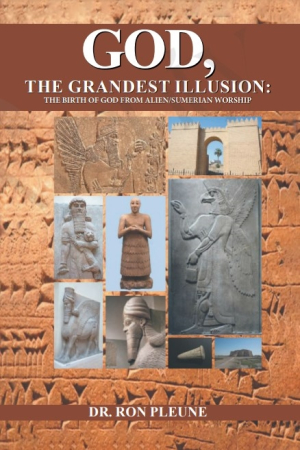God, the Grandest Illusion
The Birth of God from Alien/Sumerian Worship
God, the Grandest Illusion is a provocative, esoteric text that suggests extraterrestrial influence upon human evolution.
Ron Pleune’s piquing ancient history text God, the Grandest Illusion discusses extraterrestrial activity on Earth alongside an argument against the existence of God.
God, the book says, was a concept that awestruck human beings used to explain alien life forms—cosmic humanoids who were thirty-five hundred years more advanced than human beings at the first point of contact. Thirty-nine extraterrestrial contributions to Sumerian society are named in support of this belief. People built world religions around such encounters, it claims, and this knowledge validates free will, the release from religious constraints, and choosing to live in peace. But this contact, it argues, also led human beings to avarice, hubris, and wars. It says that extraterrestrials manipulated the human genome, too, and that people became a race of slaves.
The text references images of spacecraft in art from cave drawings onward as proof. It also finds proof of alien life in the Bible—a book here said to have been written by fallible humans, full of errors, omissions, and contradictions. Contemporary sightings by astronauts and pilots are also referenced. Pleune also claims personal contact with extraterrestrials, saying that they can be summoned via light-codes. But most central to the book’s arguments is Eduard Albert Meier’s The Goblet of the Truth, which details Meier’s years of encounters with extraterrestrials. It purports to pass on their teachings, communicated to Meier via telepathic transmissions. Still, the book’s excerpts from Meier’s complex work are underexplained, even given its extensive indexing of topics, definitions, and explanations.
While its tone is passionate, the book’s persuasiveness is limited by its unanswered questions. These include the question of why extraterrestrials should be trusted, given the book’s reports of their past manipulations for selfish ends. That it covers recent encounters with extraterrestrials in friendly terms is not enough to inspire confidence that future encounters would be beneficial to humanity. Further, garbled sentences, malapropisms, spelling errors (including with Meier’s name), and punctuation and agreement errors undermine its delivery. It also underexplains timeline discrepancies: the book has the first extraterrestrial colonization of Earth beginning in twenty-two million BCE, and the construction of Egypt’s pyramids is said to be thousands of years earlier than modern dating methods suggest. Nor do its touches of humor, such as the note that rejection can make a person feel that even their pet rock is against them, make it more convincing.
God, the Grandest Illusion is a provocative, esoteric text that suggests extraterrestrial influence upon human evolution.
Reviewed by
Kristine Morris
Disclosure: This article is not an endorsement, but a review. The publisher of this book provided free copies of the book and paid a small fee to have their book reviewed by a professional reviewer. Foreword Reviews and Clarion Reviews make no guarantee that the publisher will receive a positive review. Foreword Magazine, Inc. is disclosing this in accordance with the Federal Trade Commission’s 16 CFR, Part 255.

